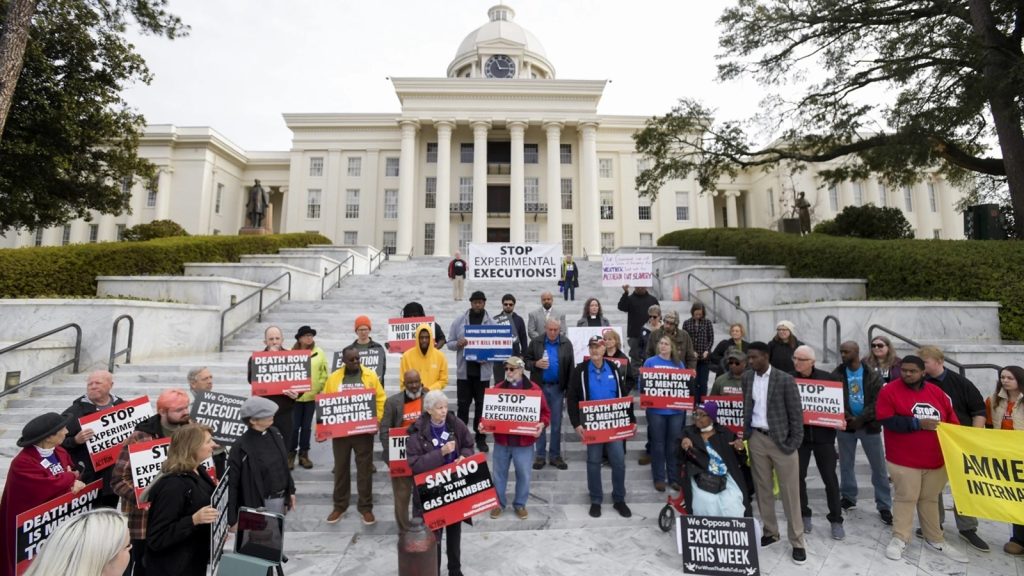MONTGOMERY, Ala. (AP) — A federal judge on Friday refused to block the scheduled execution of Demetrius Frazier, ruling that the inmate had not provided sufficient evidence to prove that Alabama’s nitrogen gas execution method is unconstitutionally cruel or causes psychological terror.
Chief District Judge Emily C. Marks denied Frazier’s request for a preliminary injunction that sought to either halt his execution, scheduled for Thursday, or require the state to administer a sedative before using nitrogen gas. Marks ruled that Frazier did not meet the high legal standard necessary to justify stopping the execution.
“Frazier fails to meet his burden to establish that the Protocol does create a substantial risk of serious psychological pain such that the Protocol violates the Eighth Amendment,” Marks wrote in her ruling.
Frazier is set to be executed for the 1991 rape and murder of Pauline Brown, a woman from Birmingham, Alabama. According to prosecutors, Frazier broke into Brown’s apartment, raped her, and then shot her in the back of the head.
Alabama’s Use of Nitrogen Gas in Executions
Alabama became the first state to use nitrogen gas for executions in 2024, carrying out the first three executions with this method that year. The procedure involves placing a respirator gas mask over the inmate’s face and replacing breathable air with pure nitrogen, ultimately causing death due to a lack of oxygen.
State officials have described the method as a humane and painless alternative to lethal injection. However, defense attorneys, medical experts, and human rights advocates have raised concerns that the process may result in conscious suffocation rather than an immediate and painless death.
Frazier’s legal team pointed to descriptions of the previous nitrogen gas executions to argue that the method is not as swift or painless as the state claims. They referenced reports from witnesses, including a medical expert, who described distressing physical reactions among the condemned prisoners.
Claims of Suffering and Distress During Nitrogen Executions
Dr. Brian McAlary, an anesthesiologist who witnessed the November 2024 execution of Carey Dale Grayson, testified that he saw clear “evidence of distress” in Grayson as he was executed. McAlary stated that Grayson appeared to remain conscious for up to three minutes after the nitrogen gas began flowing.
Additionally, media witnesses, including reporters from The Associated Press, described how the men exhibited shaking and convulsions on the execution gurney at the start of the process. This observation contradicts the state’s assertion that nitrogen gas executions lead to a swift and peaceful death.
Despite these claims, Judge Marks ruled that the evidence did not support a finding that the executed individuals “experienced severe psychological pain or distress over and above what is inherent in any execution.” The state has maintained that the observed movements were either involuntary muscle responses or “faked” by the inmates.
However, Marks acknowledged that there could be a constitutional limit to how long an inmate remains conscious while deprived of oxygen.
“Notwithstanding the State’s stubborn refusal at the evidentiary hearing to concede this point, the longer an inmate remains conscious while breathing in nitrogen during an execution, the more likely it becomes that the Eighth Amendment may be violated,” Marks wrote.
The Eighth Amendment prohibits cruel and unusual punishment, and the question of whether nitrogen executions meet this standard remains a matter of legal debate.
A Violent Criminal History: Frazier’s Previous Convictions
Before his conviction in Alabama, Frazier had already been sentenced to life in prison for the 1992 murder of a 14-year-old girl in Michigan.
Michigan does not have the death penalty, meaning that if he had remained incarcerated in that state, he would not be facing execution. However, because of his separate conviction in Alabama for Brown’s murder, he was sentenced to death.
Last-Minute Plea from Frazier’s Mother
As the execution date approaches, Frazier’s mother, Carol Frazier, has made a desperate plea to Michigan Governor Gretchen Whitmer, asking her to intervene and request that her son be transferred back to Michigan to serve his life sentence instead of facing execution in Alabama.
The Future of Nitrogen Gas Executions
Alabama’s use of nitrogen gas for executions has sparked intense debate about whether the method is humane or a form of torture. Despite concerns raised by medical professionals and human rights organizations, state officials continue to defend the method as an effective and constitutional means of carrying out capital punishment.
Frazier’s execution, if carried out as planned, would mark the fourth time the method has been used in the United States. His case may set further legal precedents regarding the constitutionality of nitrogen gas executions, particularly if additional evidence emerges about the suffering experienced by inmates subjected to the procedure.
With legal challenges ongoing and opposition mounting, the debate over nitrogen executions in Alabama—and across the country—is far from over.
Disclaimer – Our editorial team has thoroughly fact-checked this article to ensure its accuracy and eliminate any potential misinformation. We are dedicated to upholding the highest standards of integrity in our content.





More Stories
Federal Judge Rejects Request to Halt Alabama’s Nitrogen Gas Execution
Federal Judge Rejects Request to Halt Alabama’s Nitrogen Gas Execution
Federal Judge Rejects Request to Halt Alabama’s Nitrogen Gas Execution